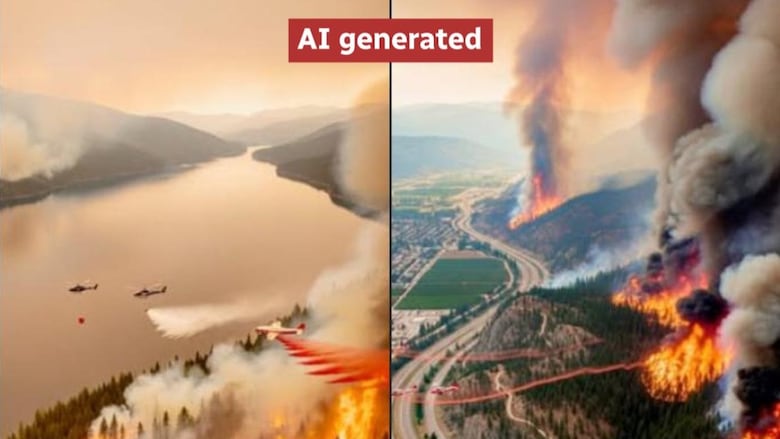AI-generated wildfire images spreading misinformation in B.C., fire officials warn
Official says that while misinformation isn't new, AI-generated images are, and add to stressful situations

The B.C. Wildfire Service is sounding the alarm on a rise in AI-generated wildfire images, which it says are contributing to online misinformation and exacerbating stressful situations.
The service shared two such AI-generated images in a social media post on Tuesday, both of which it says were shared by other accounts and were inaccurately portraying fire situations.
While the wildfire service has grappled with misinformation and conspiracy theories for years, it says the proliferation of AI images is a new wrinkle that could change someone's decision-making in an emergency if they don't know any better.
The service is asking people to download its app, sign up for local alert systems and rely on trusted media to avoid misinformation.
"There can be a lot of different pieces of information flying around, and people are making decisions about their families and their lives and their properties based on some of this information," fire information officer Jean Strong told CBC News.
"It's really important that when we're consuming this information about an emergency — that may threaten us or threaten our families — that that's as accurate as possible for all of our safety."
Strong said many of the AI-generated images firefighters are seeing this year exaggerate the size and intensity of the blazes burning around B.C., stoking fear as a result.
But she said someone could also generate an image that shows an aggressive wildfire behaving with less intensity, which could mean someone in danger may pay less attention as a result.
Hundreds of people are out of their homes already in B.C. due to fires burning across the province, with over 100 active blazes as of Wednesday morning.
"Misinformation is something that we've been working to combat for as long as I can remember," Strong said.
"The AI-generated images are a newer thing that we've noticed, especially this year, this fire season."
Think twice, prof says
Muhammad Abdul-Mageed, the Canada Research Chair in natural language processing and machine learning at the University of B.C., said AI image tools are getting more advanced by the day, and it is getting harder and harder to distinguish AI-generated images from real ones.
He said the technology is very capable of being used to spread misinformation on various issues, including climate change and wildfires.
"And it will just become more possible over time," he said.
The professor said tools that detect AI fakes can sometimes be unreliable, and it is important for people to think twice before sharing anything online, now more than ever.
"[It's] especially important in situations like this that we ... do not diffuse that information that we're not really sure about, because that could save lives, right?"
With files from Hana Mae Nassar and Liam Britten


